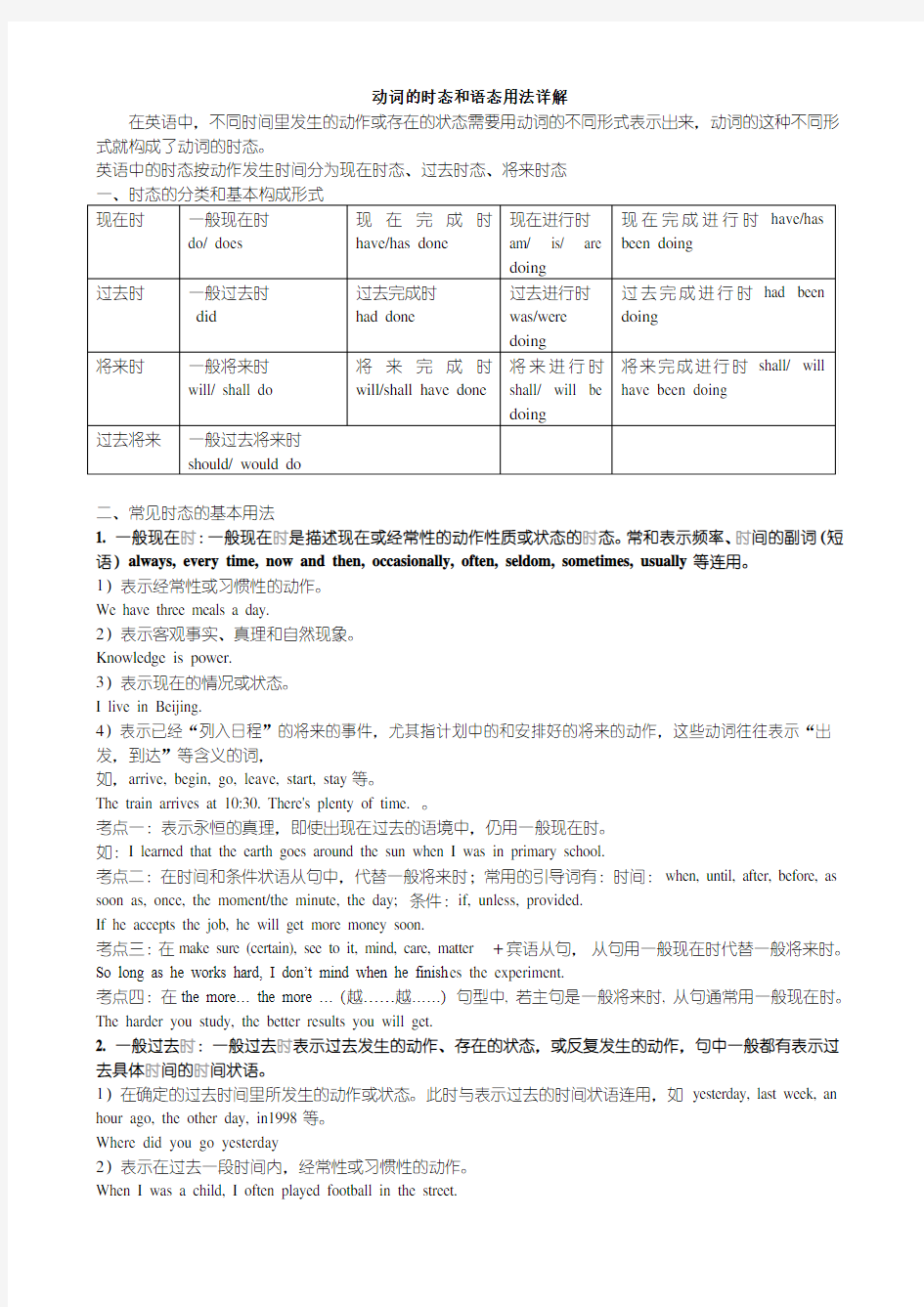
高中英语动词的时态和语态讲解
- 格式:doc
- 大小:59.50 KB
- 文档页数:8


动词的时态和语态用法详解
在英语中,不同时间里发生的动作或存在的状态需要用动词的不同形式表示出来,动词的这种不同形式就构成了动词的时态。
英语中的时态按动作发生时间分为现在时态、过去时态、将来时态
二、常见时态的基本用法
1. 一般现在时:一般现在时是描述现在或经常性的动作性质或状态的时态。常和表示频率、时间的副词(短语)always, every time, now and then, occasionally, often, seldom, sometimes, usually等连用。
1)表示经常性或习惯性的动作。
We have three meals a day.
2)表示客观事实、真理和自然现象。
Knowledge is power.
3)表示现在的情况或状态。
I live in Beijing.
4)表示已经“列入日程”的将来的事件,尤其指计划中的和安排好的将来的动作,这些动词往往表示“出发,到达”等含义的词,
如,arrive, begin, go, leave, start, stay等。
The train arrives at 10:30. There's plenty of time. 。
考点一:表示永恒的真理,即使出现在过去的语境中,仍用一般现在时。
如:I learned that the earth goes around the sun when I was in primary school.
考点二:在时间和条件状语从句中,代替一般将来时;常用的引导词有:时间:when, until, after, before, as soon as, once, the moment/the minute, the day; 条件:if, unless, provided.
If he accepts the job, he will get more money soon.
考点三:在make sure (certain), see to it, mind, care, matter +宾语从句,从句用一般现在时代替一般将来时。So long as he works hard, I don’t mind when he finish es the experiment.
考点四:在the more… the more … (越……越……) 句型中, 若主句是一般将来时, 从句通常用一般现在时。The harder you study, the better results you will get.
2. 一般过去时:一般过去时表示过去发生的动作、存在的状态,或反复发生的动作,句中一般都有表示过去具体时间的时间状语。
1)在确定的过去时间里所发生的动作或状态。此时与表示过去的时间状语连用,如yesterday, last week, an hour ago, the other day, in1998等。
Where did you go yesterday
2)表示在过去一段时间内,经常性或习惯性的动作。
When I was a child, I often played football in the street.
3)用在条件句中表示与现在或将来事实不符的虚拟语气。
If he were here now, we could turn to him for help.
4)句中有延续性时间状语,但表示与现在没有关联的过去某段时间做了某事,此时用一般过去时。
This is the primary school where our manager Mr. Smith studied for six years.
3. 一般将来时:一般将来时用来表示将要发生的事。
1)shall用于第一人称,常被will代替。will在陈述句中用于各人称,在征求意见时常用于第二人称。will (shall) + 动词原形
There is still much to discuss. We shall return to this item at our next meeting.
2)be going to + 动词原形,表示将来。
(1)主语的意图,即将做某事或打算做某事。
What are you going to do this Sunday morning
(2)计划、安排要发生的事。
I'm going to the airport to pick up my aunt from America this afternoon.
(3)有迹象要发生的事。
Look at the dark clouds; there is going to be a storm.
注意:be going to与will的区别
be going to既可指主观打算做某事,也可指客观迹象表明将要发生某事;
will往往指没有经过计划而临时出现的意图,常伴有说话者的主观意识或表示将来必然发生的事。
I'm going to quit my present job. (现在的打算,事先经过思考,指向将来)
I'll answer the door. (未经事先考虑的意图)
The little boy is going to fall over. (根据客观迹象判断)
I hope it will be fine tomorrow. (主观意愿)
3)“be + 不定式”表将来,表示按计划安排的事或按职责、义务或要求必须去做的事等。
We are to discuss the report next Saturday.
The meeting is to take place at 8:00 tomorrow morning.
注意:be to 和be going to的用法比较
be to表示客观安排或受人指示而做某事。
I am to play football tomorrow afternoon. (客观安排)
be going to则表示主观的打算或计划。
I am going to play football tomorrow afternoon. (主观安排)
4)“be about to do”意为“马上做某事”,表示即将发生某事,该事将发生在很近的将来,不能与tomorrow, next week等表示明确将来的时间状语连用。
He is about to leave for Beijing.
考点一:一般将来时总是用在一些时间状语从句或条件状语从句的主句中:We will begin our class as soon as the teacher comes.
(主句用一般将来时,从句中一定要用一般现在时替代一般将来时。)
考点二:某些表示短暂性动作的动词如arrive, come, go, leave, start等,用现在进行时形式表示将来。
I am leaving for Beijing tomorrow.
考点三:“祈使句+ and/or + 句子”,这种结构中and后面的句子谓语用一般将来时。
Use your head and you will find a way.
4. 过去将来时:过去将来时表示从过去某一时间看将要发生的动作或存在的状态。
注意:这种时态常用于主句是一般过去时的宾语从句中,表示从句的动作发生在主句之后。过去将来时同一般将来时类似,除了用would do 表示外,也可以用be going to do, be to do, be about to do及过去进行时等方式表示。
He was sixty-eight and in two years, he would be seventy.
You were going to give me your address but you didn't.